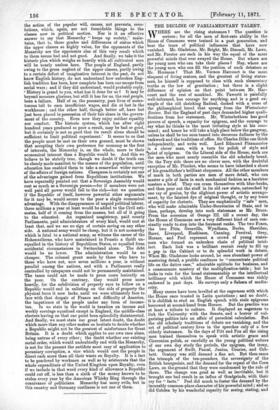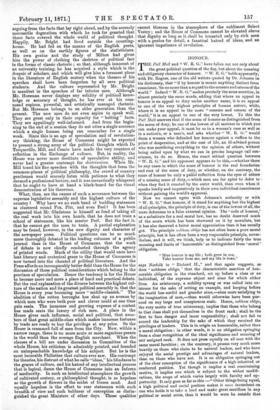THE DECLINE OF PARLIAMENTARY TALENT.
WHERE are the rising statesmen ? The question is serious ; for all the men of first-rate ability in the House of Commons were trained in a past generation, and bear the trace of political influences that have now vanished. Mr. Gladstone, Mr. Bright, Mr. Disraeli, Mr. Lowe, and Mr. Forster are each in his way the equal of the most powerful minds that ever swayed the House. But where are the young men who can take their places ? Nay, where are the young men who can fill the position of such debaters as Mr. Horsman ? That Mr. Vernon Harcourt is the most eloquent of living orators, and the greatest of living states- men, he himself is supposed to class with such elementary truths as the law of gravitation ; but there is a slight difference of opinion on that point between Mr. Har- court and the rest of mankind. Mr. Fawcett is painfully well-informed, has courage for anything, and is a good ex- ample of the old shrieking Radical, dashed with a cross of the philosophical breed that sprang from the Westminster Review. But the England of past days demanded higher quali- fications from her statesmen. Mr. Winterbotham has good powers of speech, a capacity for epigram, and the courage to say what he thinks in the most irritating style at his com- mand; and hence he will take a high place below the gangway, unless he shall be too soon tamed into decorous dullness by the taskwork and the traditions of office. Sir Charles Dilke can think independently, and write well. Lord Edmund Fitzmaurice is a clever man, with a turn for polish of style and 'point of epigram. On the Liberal side of the House, such are the men who most nearly resemble the old scholarly breed. On the Tory side there are no clever men, with the doubtful exception of Mr. Plunket, who seems to have inherited a share of his grandfather's brilliant eloquence. All the other members of mark in both parties are men of mere detail, who can master a pile of facts in such mechanical fashion as a barrister masters a brief. They can cram themselves with blue-books, and then pour out the stuff in its old raw state, untouched by one ray of genius, by the slightest power of artistic arrange- ment, by the faintest dye of original thought, or by any trace of capacity for rhetoric. They are emphatically "safe " men, who will make admirable Under-Secretaries of State, and in time, perhaps, develop into such statesman as Mr. Bruce. From the accession of George III. till a recent day, the the House of Commons saw a very different kind of men con- stantly ready to step into the foremost ranks. The two Foxes, the two Pitts, Grenville, Wyndham, Burke, Sheridan, Barre, Liverpool, Huskisson, Canning, Percival, Grey, Horner, and Peel represent a crowd of young states- men who formed an unbroken chain of political intel- lect. Each link was a brilliant recruit ready to fill up a gap in the Cabinet or to do splendid work in debate. When Mr. Gladstone looks around, he sees abundant power of mastering detail, a prolific readiness to "concentrate political life on the dative case," admirable aptitude for business, and a consummate mastery of the multiplication-table ; but he looks in vain for the broad statesmanship or the intellectual brilliancy with which the House of Commons was richly endowed in past days. He surveys only a Sahara of medio- crity.
Many sneers have been levelled at the eagerness with which the House once trusted in Latin quotations ; and no doubt, it is childish to stud an English speech with stale epigrams borrowed at second-hand from Horace. But the practice was at least a tribute to culture. It displayed an eagerness to link the University with the Senate, and a horror of vul- garizing politics into an affair of parochial calculation. But the old scholarly traditions of debate are vanishing, and the art of political oratory lives in the speeches only of a few elderly statesmen. In the days of Pitt and Fox all the rising men trained themselves to speak with artistic grace and Ciceronian polish, as carefully as the young political writers of our own day study the periods, the epigram, the irony, the argument of Swift, Pascal, Junius, Courier, and Cob- bett. Oratory was still deemed a fine art. But then came the triumph of the ten-pounders, the sovereignty of the British bourgeoisie, and the demand for the repeal of the Corn Laws, on the ground that they were condemned by the rule of three. The change was good as well as inevitable, but it brought one bad result in an influx of Gradgrinds, with their cry for " facts." Peel did much to foster the demand by the incurably common-place character of his powerful mind ; and so did Cobden by his wonderful capacity for seeing, stating, and
arguing from the facts that lay right ahead, and by the serenely mercantile dogmatism with which he took for granted that those facts covered the whole world of political thought. Happily, Mr. Bright had lived outside the counting- house. He had fed on the manna of the English poets, as well as on the earthly figures of the statisticians. His own genius and the study of Milton had given him the power of clothing the skeleton of political fact in the forms of classic rhetoric ; so that, although innocent of an university training, he has acquired a style which is the despair of scholars, and which will give him a foremost place in the literature of English oratory when the themes of his speeches shall have been forgotten by all save political students. And the culture represented by Mr. Bright is manifest in the speeches of far inferior men. Although Mr. Horsman never displays any solidity of political know- ledge or accuracy of thought, he has ever at his com- mand copious, powerful, and artistically managed rhetoric. But Mr. Horsman belongs to an older generation than the present. The new men do not even aspire to speak well. They are great only in their capacity for " bolting " facts. They are appallingly well-informed. And from the begin- ning to the end of a session they do not utter a single sentence which a single human being can remember for a single week. Since this is an age of speculation and of revolution- ary thinking, the House of Commons might be expected to present a strong array of the political thoughts which De Tocqueville, Mill, and Comte have made the very counters of reflection in the Exchange of culture. But, in reality, the House was never more destitute of speculative ability, and never had a greater contempt for doctrinaires. When Mr. Mill toned his fine speeches with the thoughts that form the common-places of political philosophy, the crowd of country gentlemen would scarcely listen with patience to what they deemed a professional lecture, and it was sarcastically whispered that he ought to have at hand a black-board for the visual demonstration of his theorems.
What, then, are the causes of such a severance between the supreme legislative assembly and the highest culture of the country ? Why have we no such band of budding statesmen as clustered round Fox, Pitt, and even Peel ? It has been suggested that Mr. Gladstone is himself so fond of taking all the real work into his own hands, that he does not train a school of statesmen, like his master Peel. But the fact is, that he cannot get the men to train. A partial explanation . may be found, however, in the new dignity and character of the newspaper press. Political questions can be so much more thoroughly debated in the leading columns of a public journal than in the House of Commons, that the work of debate is now chiefly conducted through the agency of printed words. Much of the utility that would once have lent literary and oratorical grace to the House of Commons is now turned into the channel of political literature. And the Press affords an incomparably better field than the House for the discussion of those political considerations which belong to the province of speculation. Hence the tendency is for the House to become more and more a place of hard and practical debate. But the real explanation of the divorce between the highest cul- ture of the nation and its greatest political assembly is, that the House is every year becoming more " middle-classish." The abolition of the rotten boroughs has shut up an avenue by which men who were both poor and clever could at one time gain seats. The immense and growing expense of a contest has made seats the luxury of rich men. A place in the House gives such influence, social and political, that num- bers of that great middle-class which makes immense fortunes by trade are ready to buy the privilege at any price. So the House is crammed full of men from the City. Now, within a narrow range, there is no more acute or more sagacious person in the world than the average English merchant. When the clauses of a bill are under discussion in Committee of the whole House, his criticism is admirably pointed, and founded on unimpeachable knowledge of his subject. But he is the most incurable Philistine that culture ever saw. His contempt for theories, his distrust of what he calls "ideas," his blindness to the graces of culture, and his hatred of any intellectual process that is logical, damn the House of Commons into an Inferno of mediocrity. In such an intellectual atmosphere the growth of cultivated oratory, or philosophical thought, is as hopeless as the growth of flowers in the midst of frozen mud. And equally hopeless is the effort to rear statesmen with such • breadth of view and such boldness of conception as distin- guished the great Ministers of other days. Those qualities cannot blossom in the atmosphere of the sublimest Select Vestry ; and the House of Commons cannot be elevated above that dignity so long as it shall be tenanted only by rich men with a genius for detail, a fanatical hatred of ideas, and an ignorant impatience of revolution.































 Previous page
Previous page